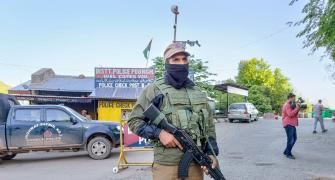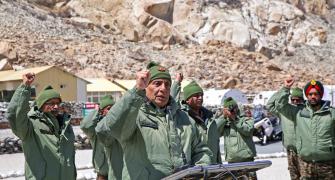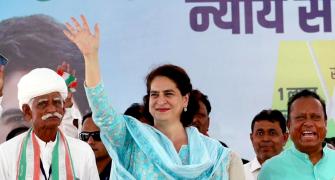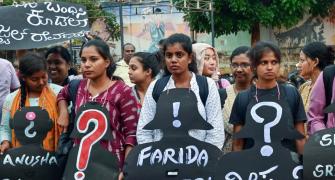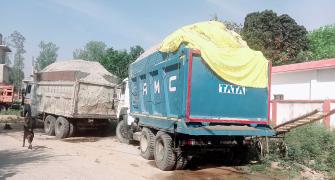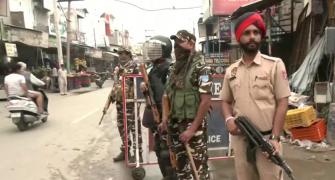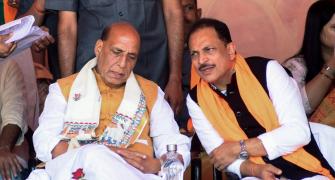The Communist Party of India, which turns 80 on Monday, will strive for unity of the Communist parties, fight fascist forces and intensify mass movements to put pressure on the United Progressive Alliance government to enact legislations to promote and defend the rights of women, minorities, dalits and tribals as part of a broadbased agenda for the coming days.
Buoyed by rapid socio-economic progress being made in China, Vietnam, Cuba and other Socialist countries, the Left party, which was founded in Kanpur on December 26, 1925, will also work relentlessly for achieving its goal of making India a world power in the 21st Century along with China and Russia for ensuring global peace and stability.
CPI General Secretary A B Bardhan told UNI on the eve of the Party's 80th Foundation Anniversary, "The two Communist parties-the CPI and the CPI (Marxist) are the core as well as the base of the Left Front. Therefore, we cannot stop at the Left unity alone, as it is not the substitute for Communist unity and the need to strengthen the Indian Communist movement."
Party National Secretary D Raja said, ''In the given situation, we will have to strive hard for providing Left - Democratic alternative for which the Communist unity is imperative." The Left party, which has got as many as 10 MPs in the Lok Sabha, has already started celebrating the party's 80 years in various parts of the country by holding meetings and related activities. It will also hold the 80th Foundation Anniversary in the national capital on Monday evening wherein eminent political personalities, academicians, social activists and mass leaders will participate.
On the new political situation on the national scene, which makes a case for Communist unity, Mr Bardhan, argued that as long as there were two major parties, and a few others with existing rival mass organisations in every sphere and in every class and section of the people (a consequence of the Party split in 1964) some conflicts and differences would continue to appear from time to time.
''Though joint actions and coordinated bodies are there involving the mass organisations, they cannot unite unless the political leadership come together," the CPI veteran said.
It is to be noted that despite Mr Bardhan's passionate appeal for Communist unity, the 'big brother' the CPI(M), which has as many as 43 MPs in the Lok Sabha, has been cold to the proposal.
The CPI General Secretary, however admitted that some differences on certain ideological and policy issues between the CPI and the CPI(M), remains.
''But the differences are not static, they change with the movement and our joint actions. They can also be discussed and narrowed down. In the process the ideological level of the Communist ranks has to be raised,'' he said.
''An uncoordinated Left, or a divided communist movement cannot adequately perform the gigantic and historic tasks that are ahead,'' Mr Bardhan said adding that the need of the hour is to establish a secular, democratic combination an the urgent basis.
''It is the Left that has to be the backbone of such a combination or movement and act as a decisive and unifying force... It is a political issue, one of developing movement and struggles and not just an issue of coming together for winning a few seats. Nor is it an issue raised due to anybody's weakness.'' the CPI leader said, while stressing that ''the split in the CPI in 1964 had adversely affected Indian Communist and Left movement.''
On the immediate challenges before the Left parties, Raja enlisted the political challenges as those of communalism, fascism, casteism, which he said, could be resisted by empowering women, dalits and tribals, youth and the unemployed.
''We also need to step up our work among the minorities,'' he said adding that these, in particular, the Muslims, looked upon the Left as the most steadfast champion of secularism and rights of minorities.
Raja said, besides, the threat from the ''fascist'' forces the weakening of the national political parties in the Hindi heartland also played its part in pushing them in the ''web of caste based parties,'' which has strengthened the trend of ''vote bank politics.'' He rejected media reports that the CPI was ''withering'' as incorrect. ''We are gaining strength.. We are winning elections... we are one of the national parties, with nationwide presence... young people are joining us,'' he asserted.
He pointed out that the CPI with the strength of 10 MP's in the Lok Sabha was also partner in the West Bengal, Manipur and Tripura governments.
The CPI was not only in the forefront of country's independence movement but also a forerunner in unionising workers, Central and state governments' employees, women, students and youth, Raja added.

